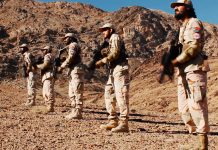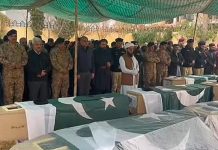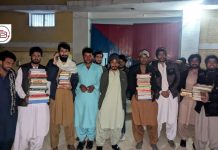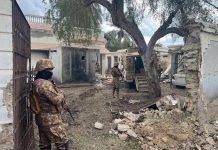The Peshawar high court has acquitted 200 convicts previously sentenced by the military courts. The high court maintained that the convicts had been sentenced only through ‘confessional statements’ and none had been given a ‘fair trial.’
According to details, the Peshawar high court has ordered the immediate release of 200 convicts that had been sentenced by the military courts previously. Presided by Chief Justice Waqar Ahmed Seth and Justice Muhammad Naeem Anwar, the high court has suspended 100 due trials of military court convicts because of the ‘absence of records.’
In Pakistan, the military tribunals were established after the terrorist attack on 16th December 2014 in Army Public School in Peshawar. The Pakistani government soon allied with the military establishment which resulted in the 20-point National Action Plan (NAP). One of these points was the establishment of special courts that will try and sentence convicts under Army supervision. These courts were granted a two-year tenure that could be extended by the government, as it has been two times since then.
The Peshawar high court had overturned approximately 70
convicts of military courts in October 2018. In its final judgment, the high court detailed multiple reasons for overturning the decisions of the military courts: the convicts were produced before the court after years of extrajudicial confinement and torture; their relatives were kept oblivious of the legal hearings; the convicts were barred from hiring a lawyer on their own expense; the convicts were gratuitously arrested, as there had been no case registered on them before their arrests by the military; in every case, there had been no reliable source other than the same fabricated confessional statement, which is not considered a credible evidence for the conviction of an accused in Pakistani legal system.
The final judgments also said that the acquitted convicts had been registered as ‘missing persons’ from different parts of Pakistan – especially Balochistan and Khyber Pakhtunkhwa – that had been missing for as much as 8 years before their production in the courts. The confessional statements of all the convicts had had the exact details and handwriting; only the dates and places of arrests had been changed. The final judgment asserted that the convicts had been framed in false indictments only after their arrests.
In their first two-year term, the military courts had convicted 274 people – 161 were sentenced to death and 113 were sentenced for prison – on terrorism charges. The details of almost half of the convictions were not released, whereas, for the released information on the remaining cases, the judicial inquiry revealed that 95% of them based solely on confessions. It is highly suspected that the military courts exercise aggression to make the detainees acquiesce.
International Commission of Jurists (ICJ), an international human rights organization, termed the military courts as a “disaster of human rights in Pakistan.” In a paper, the ICJ demonstrated how the enforced disappearances from Balochistan and KPK are whitewashed by the military courts. Instead of extending the “abusive process”, ICJ adds, the parliament must “take a stand in the defense of the rights of all people in Pakistan.”
It is pertinent to mention that Balochistan and KPK are plagued with enforced disappearances and extra judicial killings. According to a campaign group formed by the families of missing persons, Voice for Baloch Missing Persons (VBMP), as many as 45,000 Baloch men, women and children from Balochistan have been disappeared, who are languishing in torture cells.
VBMP also alleges that at least 5,000 missing persons have been killed and dumped over last one decade.
Whereas, The Pashtun Tahafuz Movement (PTM) or Pashtun Protection Movement, is working with the families of those who have disappeared during more than 15 years of unrest in Pakistan’s northwestern Federally Administered Tribal Areas (FATA), Khyber Pakhtunkhwa Province, and parts of southwestern Balochistan.
The party has been critical of the state’s policies and specifically the army in Waziristan, for a large number of enforced disappearances and violations of human rights.
Frederick Rawski, ICJ’s Asia director, said that the extension of the tenure of the military courts is an attempt of the Pakistani state to conceal the “Government’s failure to enact reforms to strengthen the criminal justice system.” He further added that Pakistan must focus on its human rights abuses and strive to deliver justice to the “victims of terrorism” instead of extending the tenure of the military courts.
Many other human rights organisations such as UNHCR, Amnesty and Human Rights Watch have been taking notices time to time but no measures have been taken by the state towards solving this alarming issue.






























